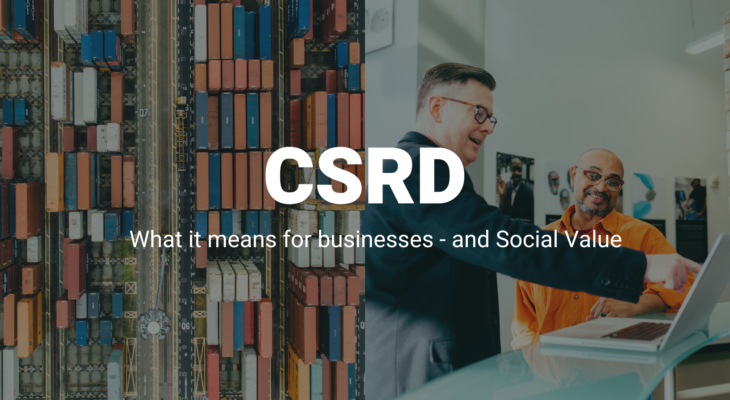In an era where corporate responsibility and impact are under closer scrutiny than ever before, the European Union’s Corporate Sustainability Reporting Directive (CSRD) represents a significant step change.
In a single swoop, the Directive will hold businesses to account for their impact on a range of stakeholder groups across the value chain. This will effectively move the discussion around corporate responsibility beyond financial impact into the realm of Social Value.
So, what does CSRD mean for businesses in practical terms?
Read on for a breakdown of the legislation’s implications and how it promises to reshape the corporate landscape for a more sustainable future.
What does CSRD do?
Where previous EU-endorsed frameworks like the UN Sustainable Development Goals or Global Reporting Initiative have been voluntary, CSRD obligates businesses to disclose their impact on the environment and society through the European Sustainability Reporting Standards (ESRS). All large companies operating in the EU and listed EU companies will be in scope in the coming years (with the exception of micro-enterprises) through a tiered roll out.
This alone makes CSRD a watershed moment for corporate reporting. But even greater significance lies in the Directive’s enforcement of a ‘double materiality’ approach to reporting.
From single to double materiality
CSRD marks a departure from the traditional single materiality approach, instead adopting a ‘double materiality framework’.
If you aren’t sure what this means, here’s an easy breakdown:
- Single materiality: Under a single materiality approach, sustainability matters are deemed material if they trigger significant financial implications. This is in alignment with traditional Environmental, Social and Governance (ESG) principles, which tend to prioritise mitigation of financial risk and pursuit of material financial opportunity.
- Double materiality: Double materiality goes a step further, taking into account both ‘financial materiality’ and ‘impact materiality’. This means it covers impacts on individuals, communities, and the environment – potential and actual, positive and negative, immediate and over time.
The Directive casts a wide net, covering impact on stakeholders up and downstream the value chain, including suppliers, consumers, and employees.
CSRD’s expanded scope has the potential to enshrine a key principle in legislation: that businesses have a responsibility to create positive social, economic, and environmental outcomes for society at large.
Standards under ESRS
As we’ve covered, CSRD effectively mandates in-scope businesses to report under the European Sustainability Reporting Standards. Let’s take a closer look at these standards.
The ESRS framework comprises two overarching standards, and ten topical standards covering Environmental, Social, and Governance sustainability matters.

All the topical standards typically cover three basic ‘Disclosure Requirements’, which are further broken down into various data points relating to:
Take the ‘Affected Communities’ Standard (S3) as an example. Under ESRS, businesses would report against specific areas such as economic, social and cultural rights, civil and political rights, and particular rights of indigenous people. Where relevant, they must then report on:
- Policies related to affected communities.
- Processes for engaging with affected communities about impacts.
- Remediating negative impacts and channels for affected communities to raise concerns.
- Actions around material impacts on affected communities, mitigation of material risks, pursuit of material opportunities related to affected communities, and the effectiveness of those actions.
- Targets related to managing material negative impacts, advancing positive impacts, and managing material risks and opportunities.
CSRD mandates this information be reported in a Sustainability Statement (alongside a Management Report), covering impact against relevant ESRS criteria.
The convergence of Social Value and ESG
CSRD is a significant step forward for both ESG and Social Value. While ESG approaches traditionally focus on ‘outward-in’ financial materiality approaches, CSRD necessitates an additional ‘inside-out’ perspective.
By compelling businesses to assess their impacts on the wider world through a double materiality lens, the Directive embeds the ‘positive good’ focus of Social Value into the EU’s reporting regime.
CSRD is a pivotal opportunity for businesses to embrace their role in steering us towards a more sustainable future where people, place and planet are central considerations alongside profit.
Guy Battle, CEO of Social Value Portal
What next?
As this Directive shows, businesses being held accountable for their contributions to society and the planet is the new normal. Those that don’t reimagine their propositions accordingly risk being left behind.
To understand how Social Value Portal can help you embed positive impact in your operations and respond effectively to a shifting legislative landscape, book a discovery call with one of our experts.





